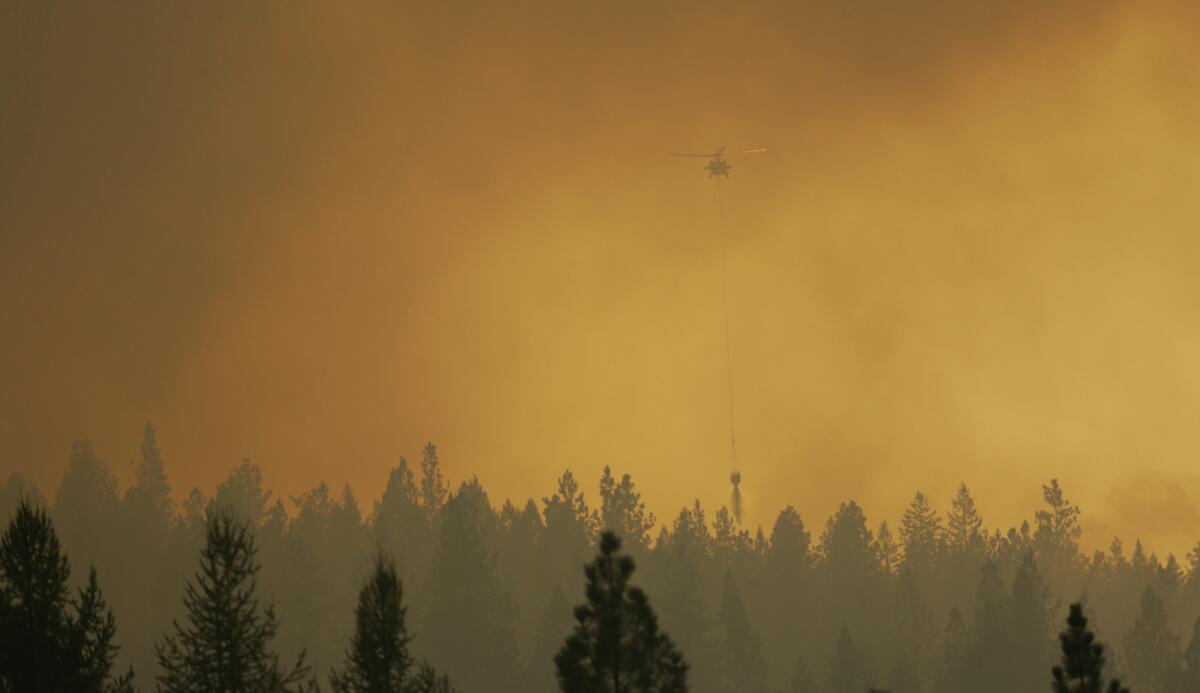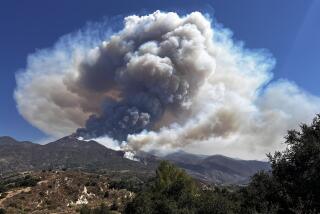As wildfires rage and budgets dwindle, more federal funds sought for firefighting

A helicopter makes a water bucket drop on a wildfire near Omak, Wash. Fires continue to rage across Washington state.
Reporting from Seattle — The record wildfire season scorching the West is prompting renewed calls for Congress to change how it funds firefighting, a push that comes as the head of the Forest Service said the agency would soon exceed its firefighting budget for the year — again.
In a letter to regional foresters and other employees, Tom Tidwell, the chief of the Forest Service, said the agency would have to borrow money from other programs the agency runs, a practice that has become increasingly common as wildfires grow in size and intensity and increasingly threaten populated areas.
This year, for the first time, the agency is spending more than half its budget to fight wildfires.
“Once again we have to shut down many parts of our mission to fulfill our wildfire suppression responsibilities within the funds available to the agency,” Tidwell wrote last week.
He noted that the agency received $1.01 billion for firefighting this fiscal year but that its projections for costs ranged from $869 million to $1.53 billion. In his letter Tuesday, Tidwell said the agency had only $174 million remaining, and “we anticipate the current extreme fire activity to continue through the end of the fiscal year,” which ends Sept. 30.
In the Northwest, blazes have continued to expand. In eastern Washington, nearly a million acres have burned, three firefighters have died, thousands of people have been evacuated, scores of structures and houses have been lost, and air quality in many areas has been declared unhealthful.
Forecasts include cooler temperatures and rain in some places, which could help calm the fires. But higher winds are also forecast, which could make them worse.
Optimism would be much higher, said Lisa Romano, a fire information officer for blazes burning near Chelan, Wash., “if the forecasts were for 3 feet of snow.”
Calls for changing the way the federal government pays to fight fires — as well as how it actually fights them and tries to prevent them — are hardly new. For many years, the Forest Service has seen its firefighting costs soar relative to what it pays for other programs, including some to reduce underbrush and smaller trees that can fuel larger fires.
This month, after three firefighters died battling a blaze near Twisp, Wash., lawmakers and officials expressed sympathy and support for firefighters and their families and declined to use the incident to press for policy changes. Last week, however, several have made public pleas for revising Forest Service funding so that other programs are not at the mercy of wildfires.
On Thursday, Sen. Maria Cantwell of Washington, the ranking Democrat on the Senate Committee on Energy and Natural Resources, held a committee field hearing in Seattle to promote a bill she says she will introduce this fall, the Wildland Fire Management Act of 2015, which would increase funding for prevention efforts and firefighting equipment, such as planes that drop fire retardant.
On Friday, Sen. Ron Wyden, a Democrat from Oregon, urged support for a bill he has proposed to pay for fighting the largest fires with a special line of funding outside the regular Forest Service fire-suppression budget.
He emphasized during a call with reporters that a politically diverse group of Western senators backed some form of change — and that the Obama administration supported his plan. He was joined by Agriculture Secretary Tom Vilsack, whose department oversees the Forest Service.
“We do have commitments now that we didn’t have before,” Wyden said in the call. “To have the secretary and the president with us on it is hugely helpful.”
Vilsack said: “We have a national treasure here, and we want to do a better job of preserving and protecting that national treasure. We just simply have to have the resources and the flexibility to do so, and Sen. Wyden’s bill will give us that opportunity.”
Wyden said he believed the Senate could pass a bill as soon as next month. The House has already passed a bill, which it says would end the Forest Service budget transfers and make it easier to harvest trees on some Forest Service lands by removing some environmental restrictions.
“This will reduce project planning times and the overall cost of implementing vital forest management activities,” Parish Braden, a spokesman for the House Committee on Natural Resources, wrote in an email on Friday. “We hope the Senate acts on a package that addresses both fire borrowing and our management challenges.”
william.yardley@latimes.com
Twitter: @yardleyLAT
More to Read
Sign up for Essential California
The most important California stories and recommendations in your inbox every morning.
You may occasionally receive promotional content from the Los Angeles Times.











